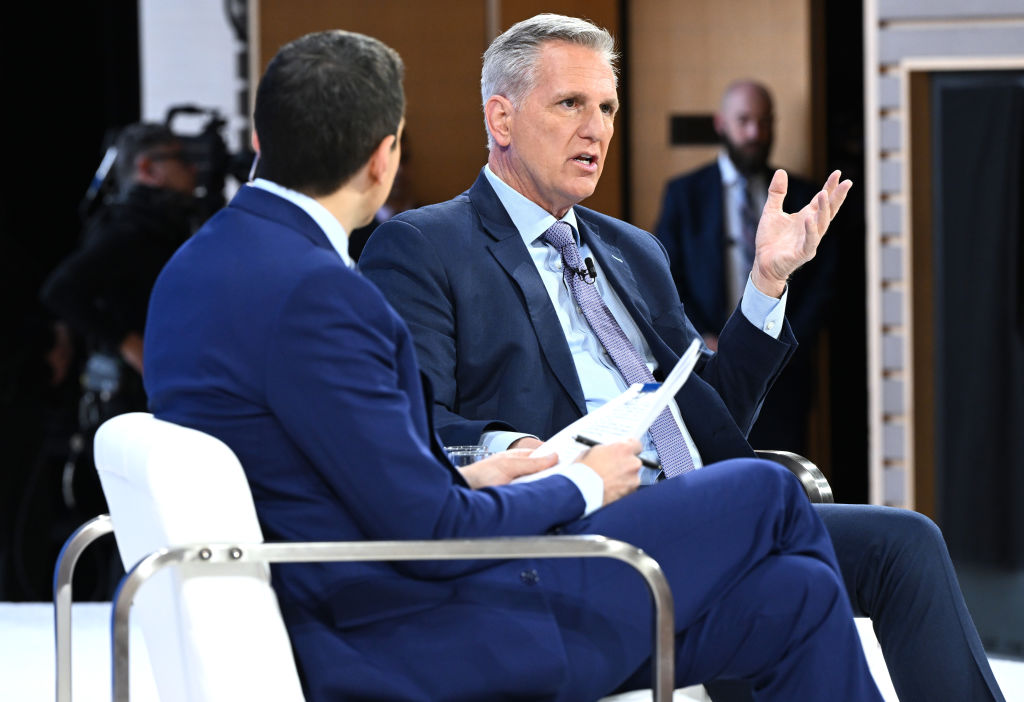Happy Monday! We’ve been learning a lot at Turning Point USA’s AmericaFest—if you’ve ever been sad there’s no explicitly right-wing bottled water on the market, have we got news for you.
Up to Speed
- At a rally in Durham, New Hampshire, this weekend, Republican presidential frontrunner Donald Trump said illegal immigrants were “poisoning the blood of our country,” a sentiment he later repeated on his social media account. In a rare direct response to the former president, a White House spokesman said Trump’s remarks echoed “the grotesque rhetoric of fascists and violent white supremacists.”
- Nikki Haley is surging into second place in New Hampshire, according to a new CBS News poll of GOP primary voters there. Trump still has a big lead ahead of the January 23 primary election, with 44 percent of likely primary voters saying they support him and Haley in second at 29 percent. In a distant third and fourth are Ron DeSantis at 11 percent and Chris Christie at 10 percent. CBS News describes the former U.N. ambassador as having “consolidated much of the non-Trump” vote in the Granite State.
- If Trump’s lead in New Hampshire is comfortable, it appears undisputed in Iowa. The CBS News poll found Trump with 58 percent support among likely GOP caucusgoers, with DeSantis far behind at 22 percent and Haley at 13 percent. That’s a bit of a wider lead for Trump than what was shown last week in the reliable Iowa Poll from veteran pollster J. Ann Selzer (51 percent for Trump) but in line with the general tenor of the race. At this point, Iowa Republicans look poised to deliver for Trump on January 15, the day of the caucuses.
- On Saturday Republican political operative Jeff Roe resigned from his role as senior adviser to the main super PAC supporting DeSantis. Roe’s departure from Never Back Down, the group responsible for the governor’s voter turnout operation, came just hours after the Washington Post published a story detailing the extensive infighting among those supporting the Florida governor’s presidential bid. Among the claims in the story were that Never Back Down officials tied to Roe’s campaign strategy firm Axiom had been fired due to mismanagement. Roe denied these claims, which were made by the group’s chairman Scott Wagner, and cited them as his reason for resigning.
- With President Joe Biden now trailing Trump in the RealClearPolitics average testing a hypothetical rematch of the 2020 election, the White House on Monday morning issued a four-page memorandum from communications director Ben LaBolt detailing a series of legislative and policy accomplishments the Democratic incumbent “delivered” this year. This comes as the Washington Post’s Tyler Pager reports Biden and First Lady Jill Biden have grown frustrated by the president’s stubbornly low polling.
Kevin McCarthy: ‘I Never Lost’

Rep. Kevin McCarthy emphasized more than once during a wide-ranging interview with The Dispatch that he was the only Republican leader in Washington during his tenure as a top party boss who did not preside over a loss of seats in Congress before being unceremoniously dumped as speaker of the House in October. Senate Minority Leader Mitch McConnell of Kentucky can’t say the same; neither can former President Donald Trump.
“Remember, as leader for those five years, I never lost. I only gained seats,” the 58-year-old Californian said Friday in an exit interview at the Capitol, as he prepares, at month’s end, to resign from office after nearly 17 years. “We were the only Republican entity with a winning record.” (McCarthy is vacating the deep red 20th Congressional District, anchored in his hometown of Bakersfield, a community of roughly 400,000 in the Golden State’s interior Central Valley region.)
McCarthy was elected House minority leader by his Republican peers after the GOP lost the majority in a thrashing by the Democrats in the 2018 midterm elections. Two years later, with McCarthy as the highest-ranking House Republican for the first time, his party defied predictions of heavy losses and flipped 14 seats, almost reclaiming the majority even as Trump was ousted by now-President Joe Biden. Two years after that, House Republicans did recapture the majority, albeit narrowly after an expected GOP wave failed to materialize.
The Dispatch will have more reporting from our discussion with McCarthy—about his tumultuous time as the 55th House speaker, January 6, Trump, the state of the Republican Party, and a few other topics—later this week. But with today’s edition of Dispatch Politics, we’re focusing on the 2024 race for the House majority and whether the Republicans can hang onto their advantage given the political challenges that lie ahead. Keep in mind, House Republicans began the 118th Congress with a four-seat majority.
With the December 1 expulsion of New York Republican George Santos and McCarthy’s pending resignation, the House majority is poised to begin the election year with an edge of just two seats. Two nonpartisan campaign ratings publications—Cook Political Report with Amy Walter and Inside Elections with Nathan L. Gonzales—are projecting a competitive contest for control of the House which, for now at least, could go either way. What does McCarthy think? “It is easier for Republicans in the House to win seats [this] election cycle than the last two,” he said.
How many? “I think more than 10,” McCarthy said, without hesitating. “Let me just walk you through it.”
Before we get to that, remember that whatever your opinion of McCarthy, campaign politics is his strong suit. He’s a prolific fundraiser, raising record amounts for cash for House Republicans. McCarthy also crisscrossed the country virtually nonstop since being elected to Congress in 2006—trips that taught him about the political particulars of hundreds of House districts (there are 435) and what makes winning campaigns and candidates, many of whom he recruited over the years, some of whom later turned against him.
Here’s why McCarthy claims he is bullish on House GOP gains in 2024:
No. 1, some strong Democratic incumbents are retiring, among them Rep. Elissa Slotkin of Michigan, who is running for Senate, and Rep. Abigail Spanberger of Virginia, who is running for governor. McCarthy predicts two pick-ups right there.
No. 2, there is a forthcoming mid-decade redistricting in North Carolina that will see the instant creation of multiple seats favorable to Republicans, so much so that the Democratic incumbents who are impacted aren’t even bothering to run for reelection. McCarthy predicts “a minimum three to four pickups there.”
No. 3, in Pennsylvania, Republicans will not suffer from the top-of-the-ticket drag they did in 2022 with flawed nominees for governor and Senate. “We could pick up from two to three seats,” McCarthy said. Meanwhile, McCarthy is not concerned about a court-ordered, mid-decade redistricting in New York that could cost Republicans seats they flipped in the 2022 midterm elections. Plus, he is high on the GOP nominee selected to run in the Long Island district that opened when Santos was ejected from the House.
“Now, putting all that into perspective, the presidential election is going to be the No. 1 issue,” McCarthy said. “Joe Biden can’t fix his biggest problem, which is his age. He’s got a problem with the border. He’s got a problem with inflation. If I was a Democrat, this is the year I wouldn’t want to be on the ticket.”
Selling Early Voting to ‘Stop the Steal’ Conservatives
PHOENIX—Republican voters need to embrace early voting. Ballot harvesting should be a crucial component of GOP election strategy. And the right shouldn’t be squeamish about using dirty tactics to pressure inconsistent voters to the polls—after all, do they really think the left will play fair?
These were a few of the nuggets of wisdom on offer Sunday morning from Matt Braynard, a former Trump campaign consultant turned turnout operative, during a breakout session at AmericaFest, the CPAC-plus-pyrotechnics conference put on this weekend by ascendant MAGA youth organization Turning Point USA.
“Registration and turnout—beating the left at their own game,” said Braynard, who now runs a group called Look Ahead America. “This is an area where the left has been kicking the right’s butt for longer than I’ve been alive, right? We’re gonna talk about how and why and how we can fix this, how we can overcome the disadvantage—because I actually believe that we’re naturally better at these things than the left.”
There’re a lot of empty calories at an event like AmericaFest: If you just wanted to drive down to the Phoenix Convention Center to sit in the main-stage crowd and spend your weekend hooting along with Benny Johnson at a sizzle reel of Joe Biden falling off his bike, you’d have plenty of good company.
But AmericaFest has coalition-building and educational aspirations too—hence the morning breakout sessions with folks like Braynard, focused on getting the leaders of the future up to speed on the latest strategies and techniques in the actual behind-the-scenes work of electoral politics. (Not that there wasn’t red meat on offer here too: Braynard took a minute at the top to invite attendees to one of his regular Justice for J6 rallies.)
Braynard had plenty of tips to share. Low-propensity voters, he informed his listeners, can sometimes need an extra push before they’ll turn in their ballots. He showed the audience a flyer his group distributed to target working-class voters ahead of last month’s Virginia elections, which noted that “one or more residents at this address has failed to vote in recent elections” and threatening that “failure to vote” could result in loss of Social Security, Medicare, unemployment benefits, or even child custody rights.
“Now, some people disagree with this tactic,” Braynard said. “But let me ask, does anybody here in the room think the left would hesitate to send out a mail piece like that, or a door hanger, if they thought it would help them win? Like I said—I’m tired of losing, and this is how we get in the game.”
But broadening his listeners’ horizons on the ethics of political advertising was only a small part of Braynard’s program. His primary goal was to bring his audience around on another thorny topic in today’s GOP: mail-in voting.
“So, listen, this is kind of controversial,” Braynard said. “Election-Day voting—which is something that many of our side have encouraged—is a disaster and catastrophe.”
The advent of the Stop the Steal movement and Republican voters’ cratering trust in elections has left the GOP in a difficult place. Republican voters are far more likely than Democratic voters to distrust early voting and thus disproportionately likely to cast their ballots in person on Election Day. This—as Braynard pointed out—creates some structural problems for the GOP: A person who voted early is a person whose vote is already banked and whom turnout organizations can stop spending their money pestering to vote. But a person who is planning to wait until Election Day forces those organizations to keep spending on them right down to the wire—and then, despite all the best intentions, they might get sick, or their car might break down, or their kid might have basketball practice, and they might not get around to voting anyway.
These structural dangers are why the Republican Party has spent the last few years trying to lure its voters back into getting comfortable with early voting. The Republican National Committee rolled out a “Bank Your Vote” initiative this summer, and party luminaries from Ron DeSantis to Kari Lake to even Donald Trump himself have recently urged their voters to change their thinking about mail-in ballots.
“Look, I know there’s a lot of hesitation on this,” Braynard said. “I don’t think you’re going to find a better expert on election integrity, voter fraud, that kind of stuff than me. That’s another lecture. But I promise you, that’s probably the best thing you can do to help the candidates you support win.”
Here in Phoenix, not everyone was convinced. Don Shooter, a former state lawmaker who led the charge in 2016 for Arizona to ban the practice of ballot harvesting—and was subsequently expelled from the state House after nine women accused him of sexual harassment—told The Dispatch after Braynard’s speech that “I’m for fighting the bad guys any way we can.”
“I think that what Matt’s doing is good, I think it’s effective,” Shooter said. “But if it were up to me, my plan would be one single day voting, show the ID, and have a paper trail. Right now it’s all computers—and I promise you it’s not real.”
Notable and Quotable
“This has been a difficult time for me, as I have been attacked for who I love to pursue a political agenda.While some of my actions in the past have shown poor judgement, I love my job and would never disrespect my workplace. Any attempts to characterize my actions otherwise are fabricated and I will be exploring what legal options are available to me in these matters.”
Aidan Maese-Czeropski, the Senate aide fired over the weekend for—actually, you know what, maybe just Google it










Please note that we at The Dispatch hold ourselves, our work, and our commenters to a higher standard than other places on the internet. We welcome comments that foster genuine debate or discussion—including comments critical of us or our work—but responses that include ad hominem attacks on fellow Dispatch members or are intended to stoke fear and anger may be moderated.
You are currently using a limited time guest pass and do not have access to commenting. Consider subscribing to join the conversation.
With your membership, you only have the ability to comment on The Morning Dispatch articles. Consider upgrading to join the conversation everywhere.